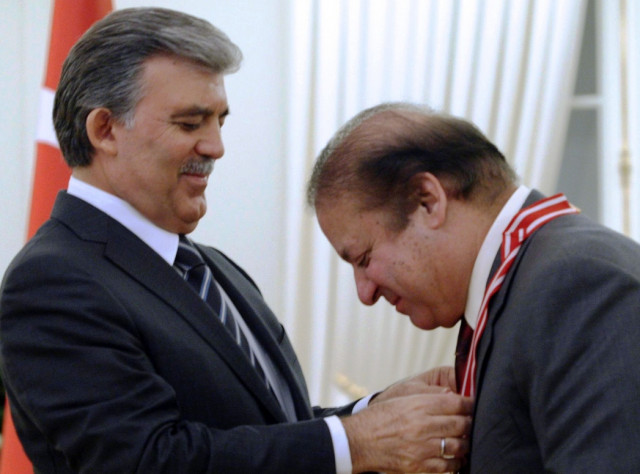Medal of Democracy: The lone avenger
For a nation that has struggled endlessly for democracy, the medal celebrating it has only seen one recipient to date.

Turkish President Abdullah Gul awards Prime Minister Nawaz Sharif with Turkey's Order of The Republic during a ceremony in Ankara, on September 17, 2013. PHOTO: AFP
A couple of months ago, newspapers were abuzz with news of a medal of democracy being conferred upon Prime Minister Nawaz Sharif by the Turkish president during his visit to Turkey. The title in question is called Cumhuriyet Nisani in Turkish or Jamhuriyat Nishani (Medal of Democracy) as our media puts it. However, there is one problem — the Jamhuriyat does not refer to any democracy that the recipient may or may not have strived for, but the fact that Turkey itself is a Republic or a Jamhuriyat. This is the reason why the official website of the Turkish president chooses to translate the award as Order of the Republic Medal of Turkey.
The medal has maintained the tradition of cordiality between the two countries. The Devlet Nishan was for example, bestowed on former president Asif Ali Zardari during his 2011 visit to Ankara. Earlier, former President Pervez Musharraf who spent his childhood in Turkey, also called the country his second home.
On the other hand, the local version of the award, the Tamgha-e-Jamhooriyat or Medal of Democracy, is supposed to be conferred upon those who perform an extraordinary service to democracy. The medal has only been bestowed once in the country’s history, when former prime minister Benazir Bhutto awarded it to the then chief of army staff, General Mirza Aslam Beg, in 1988. After General Zia ul Haq’s death in the Bahawalpur plane crash, Beg was appointed the COAS and given the circumstances at the time, martial law might have been an easy and tempting prospect. Instead, the general showed a commitment towards democracy and held the elections conducted duly, which ushered in Benazir Bhutto’s first government.

However, between 1990 and 1994, the Mehrangate scandal surfaced whereby it was alleged that the office of the COAS had used state funds to strengthen the PPP’s opponents. In October 2012, the Supreme Court of Pakistan, deciding upon a petition filed by Retired Air Marshall (ret’d) Asghar Khan, ruled that General Beg, the recipient of the Medal of Democracy was indeed guilty of extending funds to political parties of choice. There were talks of the general being stripped of his military and civilian medals, but nothing ever came through.
However, like most other things, the Pakistani nation moved on. Today, a replica of the Medal of Democracy hangs in the gallery of the State Bank of Pakistan Museum — a small silent reminder of another strange chapter in Pakistan’s history that has more twists and turns than a John Grisham thriller.
Published in The Express Tribune, Sunday Magazine, November 10th, 2013.



















COMMENTS
Comments are moderated and generally will be posted if they are on-topic and not abusive.
For more information, please see our Comments FAQ